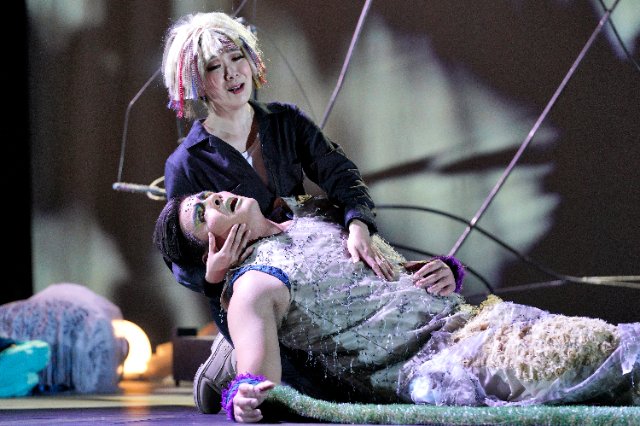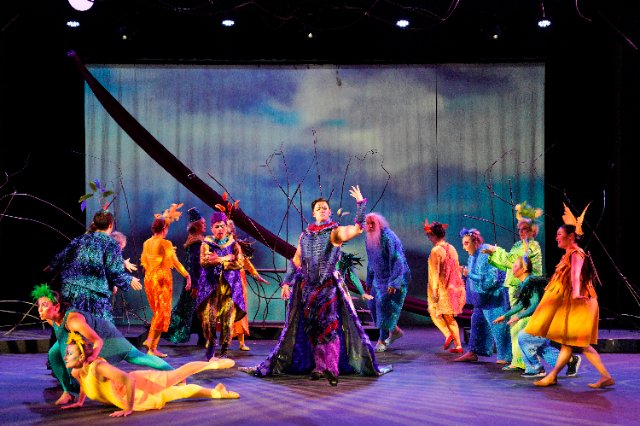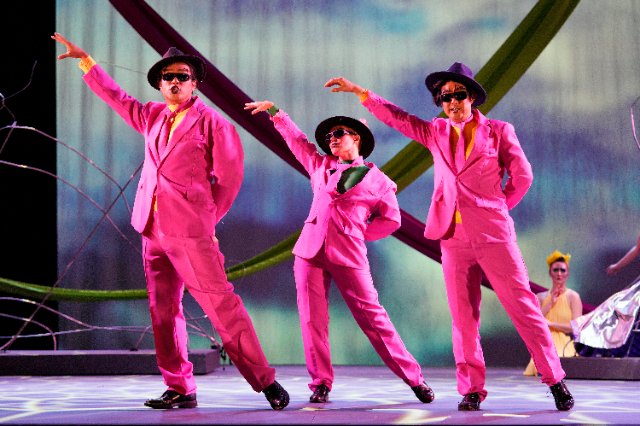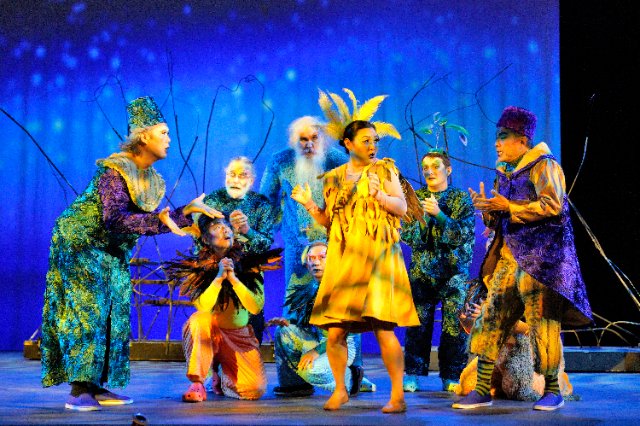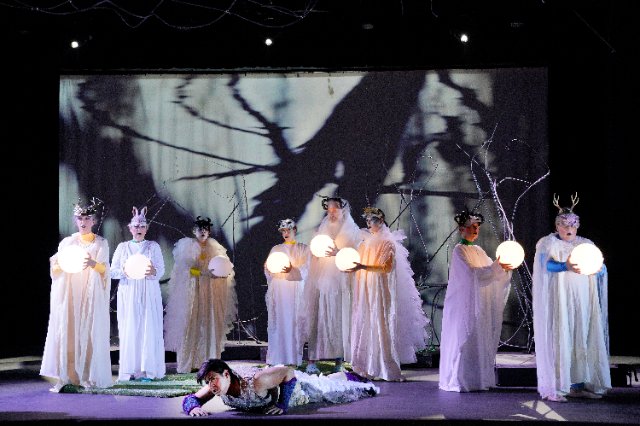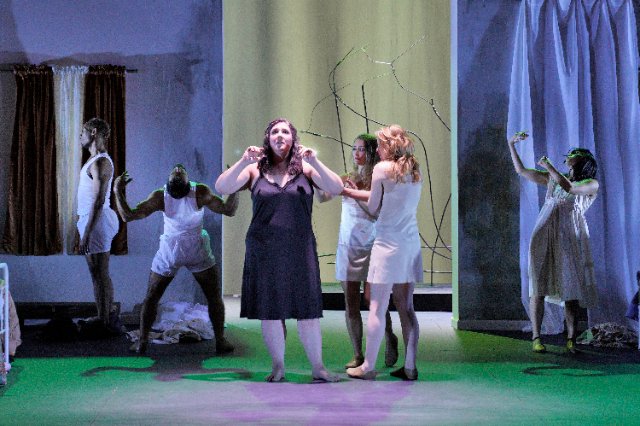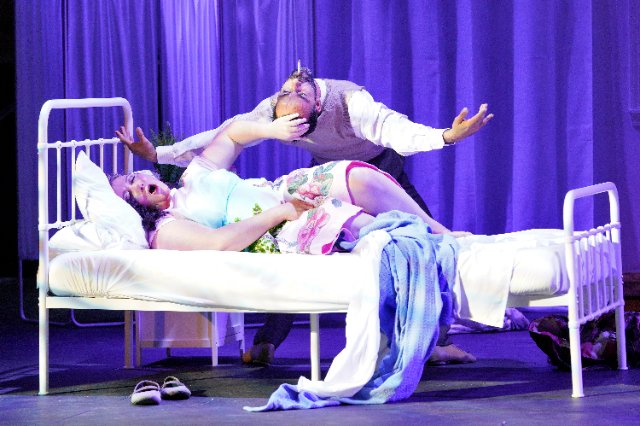The Nightingale & Erwartung - A Double Bill
West Edge Opera Offers a Dynamic Duo of Short, Atonal Operas
By: Victor Cordell - Aug 08, 2023
West Edge Opera paired these two short operas onto one bill.
“The Nightingale”
In today’s world, the replacement of human beings by technology grows at an expanding, if not alarming, rate. At first, robots, and now more human-like androids, are programmed to perform physical functions with greater speed and accuracy than people. And at first, computers, and now artificial intelligence algorithms execute mental functions of massive complexity that humans can’t accomplish, and at unimaginably fast speeds.
The concept of machines replacing humans precedes its actually happening by centuries. One such fantasy was a simple Hans Christian Anderson fairy tale in which the Emperor of China is bewitched by the song of a dull-looking nightingale. However, when a machine that looks like a more attractive nightingale appears, the real bird disappears. Piqued, the Emperor then banishes the real nightingale, only to suffer regrets. Yet, as straight forward as the plot is, the characters are not well introduced, leading to some confusion as to roles.
Igor Stravinsky composed the three-act, 45-minute opera at a time that he was abandoning the form. Though “The Nightingale” was not well received initially as a result of the dissonance of the music, it would later be acclaimed. But as the composer was turning toward dance at this time, he later extracted the music of the last two acts to become “Chant du Rossignol,” a ballet.
West Edge Opera’s production of “The Nightingale” offers an outstanding representation of the instrumental and vocal components of the work. The orchestra is well-conducted by Jonathan Khuner, and the singers suit the material well. As the nightingale, soprano Helen Zhibing Huang displays coloratura and dramatic vocal skills as well as the emotional acting needed for the role. Bass Patrick Scully as the Emperor provides a warm, deep tone and a commanding presence. The other five principals, Kevin Gino, Kristin Choi, Alice Chung, Chung-Wai Soong, and Wayne Wong also carry out their parts admirably.
Yet, rarely does an opera production owe so much to costuming and choreography. Ralph W. Hoy’s costumes are an uncommonly striking cacophony of stunning color and shape that is eye boggling and fits the cacophony of sound produced by the chorus. Dance occurs throughout, and choreographer Lucas Tischler’s designs and the dancers’ execution of balletic and modern modes adds another creative element that makes this production compelling.
Director Giselle Ty and Scenic Designer Mikiko Uesugi’s set is simple, using shiny, bent metal rods and swaths of solid colored cloth and muted projections on the back wall, but with so much visual stimulation from the costumes and dance, the simplicity of the set is desirable.
“Erwartung” (Expectation)
Arnold Schoenberg was nothing if not innovative. The father of atonality, his influence has rippled through succeeding generations of serious music composers. With “Erwartung,” his first opera, he broke a cardinal rule of drama by writing a monodrama without action, but rather with internalized thoughts, though the thoughts are so well expressed that drama results.
In a nightmarish scenario, the terrorized Woman symbolically searches for her lover in a forest. When she finds him, he is bloodied and dead, presumably murdered. Conflicting emotions plague The Woman – reminiscing and worrying (“I am alone in the heavy shadows”); pondering his possible betrayal in meeting with another woman (“Where is the whore with white arms?”); and bemoaning a future without him (“What shall I do here alone in this long, endless life?”).
Soprano Mary Evelyn Hangley is The Woman as she meets every challenge the composer puts before her – music that lacks thematic repetition; frequent changes of meter and tempo; as well as dramatic vocal leaps from the bottom of her range to the top and one high note nicely sustained. Further, the score demands around 45 minutes of musical soliloquy without respite. And Hangley conveys intimate passions and sustained lyricism while competing vocally with 30 instruments, interestingly orchestrated.
Jonathan Khuner demonstrates particular enthusiasm and precision at the baton in this short but demanding piece, as this is a project he has long wanted to conduct. His father Felix had been in the Schoenberg Circle in Vienna as a member of the Kolish Quartet, whose founder, Rudolph Kolish, was Schoenberg’s son-in-law.
To ensure that this production is not a static stand-and-deliver solo performance, the artistic contributions are enhanced. In doing so, the composer’s expressed wishes, which were to show “Erwartung” in a naturalistic forest setting, are defied. Instead, this version takes place in a hospital. However, Director Giselle Ty and Scenic Designer Mikiko Uesugi are able to powerfully use dancers as mute characters to strengthen the impact of the soliloquy.
“The Nightingale,” composed by Igor Stravinsky, with libretto by the composer and Stepan Mitusov is based on a tale by Hans Christian Anderson.
“Erwartung” (Expectation) is composed by Arnold Schoenberg with libretto by Marie Pappenheim.
The paired operas were produced by West Edge Opera and played at Scottish Rite Center, 1547 Lakeside Drive, Oakland, CA through August 6, 2023.

